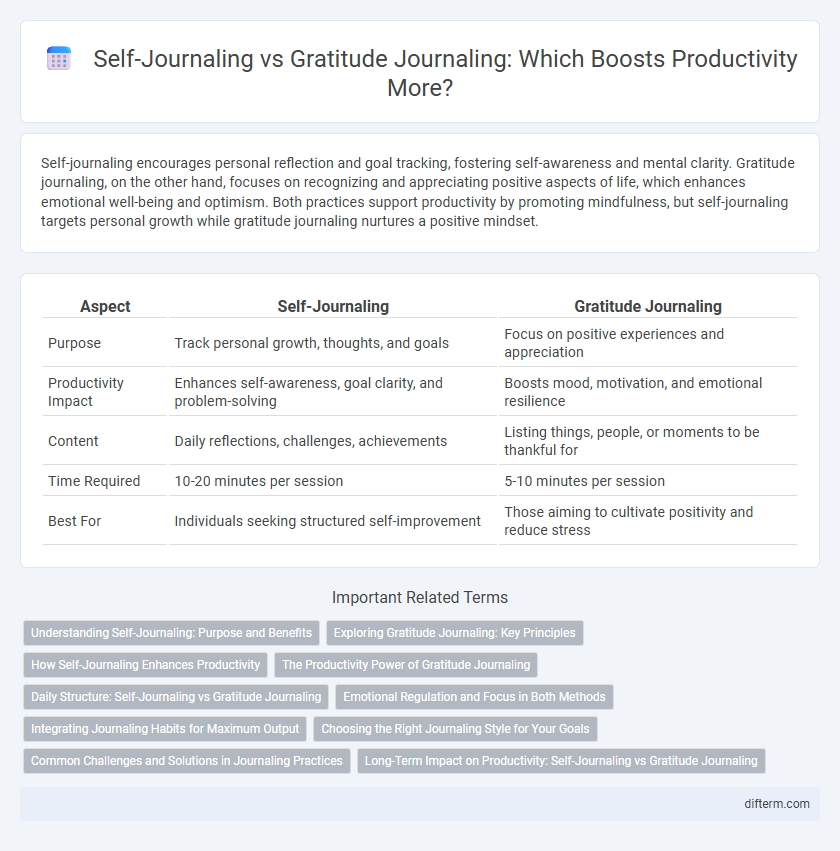Self-journaling encourages personal reflection and goal tracking, fostering self-awareness and mental clarity. Gratitude journaling, on the other hand, focuses on recognizing and appreciating positive aspects of life, which enhances emotional well-being and optimism. Both practices support productivity by promoting mindfulness, but self-journaling targets personal growth while gratitude journaling nurtures a positive mindset.
Table of Comparison
| Aspect | Self-Journaling | Gratitude Journaling |
|---|---|---|
| Purpose | Track personal growth, thoughts, and goals | Focus on positive experiences and appreciation |
| Productivity Impact | Enhances self-awareness, goal clarity, and problem-solving | Boosts mood, motivation, and emotional resilience |
| Content | Daily reflections, challenges, achievements | Listing things, people, or moments to be thankful for |
| Time Required | 10-20 minutes per session | 5-10 minutes per session |
| Best For | Individuals seeking structured self-improvement | Those aiming to cultivate positivity and reduce stress |
Understanding Self-Journaling: Purpose and Benefits
Self-journaling enhances productivity by fostering self-awareness, helping individuals identify patterns in behavior and thought processes that impact efficiency. This practice promotes goal setting and problem-solving by providing a structured space for reflection and planning, which ultimately drives personal growth and improved time management. Unlike gratitude journaling, which centers on appreciating positives, self-journaling offers deeper cognitive insights essential for sustained productivity improvements.
Exploring Gratitude Journaling: Key Principles
Gratitude journaling emphasizes recognizing and recording positive experiences to enhance emotional well-being and boost productivity. Key principles include focusing on specific moments of appreciation, maintaining consistency, and reflecting on the impact of gratitude in daily life. This practice shifts attention towards positive cognition, fostering motivation and resilience in personal and professional settings.
How Self-Journaling Enhances Productivity
Self-journaling enhances productivity by promoting focused reflection on daily goals, progress, and obstacles, enabling individuals to identify areas for improvement and prioritize tasks effectively. This practice fosters self-awareness and accountability, leading to better time management and increased motivation. Research shows that consistent self-journaling can improve cognitive clarity and decision-making, which are critical for maximizing productivity.
The Productivity Power of Gratitude Journaling
Gratitude journaling enhances productivity by fostering a positive mindset that reduces stress and increases motivation, leading to improved focus and goal achievement. By regularly acknowledging specific positive experiences, individuals reinforce neural pathways associated with optimism and resilience, which strengthens cognitive function and decision-making. Unlike self-journaling that centers on self-reflection, gratitude journaling actively cultivates emotional well-being, directly boosting mental energy and sustained productivity throughout the day.
Daily Structure: Self-Journaling vs Gratitude Journaling
Self-journaling enhances daily structure by promoting introspection, goal setting, and tracking personal growth, leading to increased focus and productivity. Gratitude journaling emphasizes recognizing positive experiences, which can boost motivation and emotional resilience but may lack the actionable planning element found in self-journaling. Combining both methods supports a balanced routine of reflection and appreciation, optimizing mental clarity and task management.
Emotional Regulation and Focus in Both Methods
Self-journaling enhances emotional regulation by allowing individuals to process complex thoughts and identify stress triggers, which improves mental clarity and focus. Gratitude journaling shifts attention to positive experiences, fostering a more optimistic mindset that reduces emotional reactivity and supports sustained concentration. Both methods contribute to productivity by cultivating a balanced emotional state and sharpening focus, essential for effective task management.
Integrating Journaling Habits for Maximum Output
Integrating self-journaling with gratitude journaling enhances productivity by combining goal tracking and positive reinforcement, creating a balanced mental framework. Self-journaling captures progress and challenges, while gratitude journaling fosters a positive mindset that reduces stress and increases motivation. Together, these practices optimize focus, resilience, and goal achievement for maximum output.
Choosing the Right Journaling Style for Your Goals
Self-journaling enhances productivity by promoting self-reflection and goal tracking, making it ideal for individuals seeking personal development and habit formation. Gratitude journaling boosts emotional well-being and motivation by focusing on positive experiences, supporting productivity through increased mindfulness and stress reduction. Selecting a journaling style aligned with your specific objectives, such as goal achievement or emotional balance, maximizes the effectiveness of your journaling practice.
Common Challenges and Solutions in Journaling Practices
Common challenges in self-journaling and gratitude journaling include consistency, time constraints, and maintaining authentic reflection. Solutions involve setting specific daily goals, integrating journaling into morning or evening routines, and using prompts to encourage honesty and depth. Leveraging digital apps with reminders can also enhance discipline and track progress effectively.
Long-Term Impact on Productivity: Self-Journaling vs Gratitude Journaling
Self-journaling fosters deep self-awareness and goal tracking, leading to sustained improvements in focus and task completion over time. Gratitude journaling enhances positive mindset and resilience, indirectly boosting productivity by reducing stress and increasing motivation. Long-term productivity gains are maximized when combining the reflective insights from self-journaling with the emotional benefits of gratitude journaling.
Self-journaling vs Gratitude journaling Infographic

 difterm.com
difterm.com